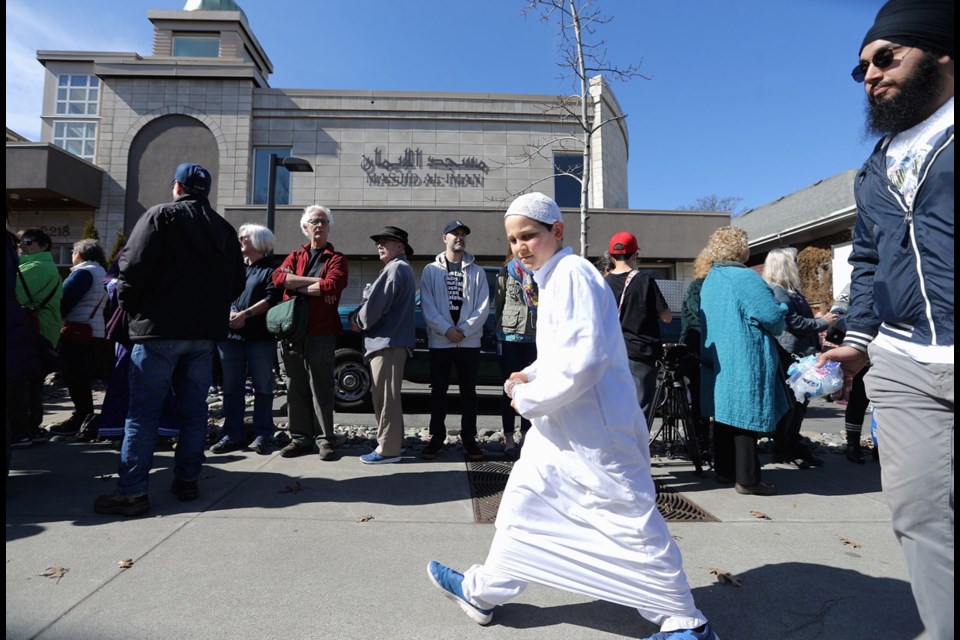 Sometimes it’s important to just get off your butt, stick your hand in the air and say you’re on the side of love and humanity.
Sometimes it’s important to just get off your butt, stick your hand in the air and say you’re on the side of love and humanity.
“All the people showing up today, that’s awesome,” said Didar Singh, standing on the Quadra Street sidewalk, gazing at the human chain surrounding the Al-Iman mosque on Friday.
Through the open door behind him came the sound of the muezzin melodiously reciting the athan, the call to prayers.
Singh belongs to the Sikh community, whose idea it was to ask Victorians to ring the mosque for the duration of Friday’s afternoon prayers. It was a sign of support following the murder of 50 Muslim worshippers in New Zealand last week.
Hundreds answered the call. It didn’t take any great act of bravery to do so, but it did take a conscious effort, a willingness to quietly do the right thing, like tending the garden to keep the weeds out.
The Anglican bishop Logan McMenamie was near the front door. “When there are people in the world who are working hard at violence and racism, we need to be working at peace and dismantling racism.”
Next to him was former Victoria councillor Chris Coleman, who had showed up at 5:30 a.m. — along with current councillor Charlayne Thornton-Joe, her husband Phil and Gary Beyer — to stand behind a sign reading: “You are our friends … We will stand watch while you pray.” They were emulating a man in Manchester, England, who had done the same thing. The mosque welcomed people to prayers five times on Friday. Coleman was there to greet them each time, right up until 9 p.m.
Gavin Wyer doesn’t usually wear a yarmulke in public but did so Friday as a statement of interfaith solidarity while standing in the chain. “As a Jew, we’ve been subjected to this kind of attack as well, and the Muslim community has certainly supported us,” he said.
Gurinder Pal Singh was one of the Sikh youth organizing the event. “The message is: ‘You’re not alone.’ ”
It’s a message that matters, said Waly Popal, chair of the mosque’s board. “We feel really secure within the wider community.” People from a wide range of backgrounds have been writing or dropping by to say: “You guys are welcome here. Don’t feel ostracized. Don’t feel different from other Victorians.” It’s comforting.
Mustafa Abousaleh, the mosque’s secretary, concurred. “To us, it just shows the importance of engagement and working together without isolation.” Having other Victorians make the effort to connect is meaningful. It was encouraging when curious non-Muslims flocked to an open-mosque day in February; they counted 1,000 empty hot-chocolate cups afterward.
Still, members of the congregation are uneasy, Abousaleh said. It’s not like we live in a hotbed of racism — “It’s very rare” — but the New Zealand mass shootings and the Quebec City mosque attack of January 2017 have left their mark. “It’s just general apprehension.”
There’s a certain vulnerability to putting faith into action. The mosque is open 24 hours a day. Strangers are welcomed — just as the New Zealand gunman was.
Is an attack likely here? Of course not — but you could have said the same of the city where last week’s terrorism occurred. Christchurch is a mirror image of Greater Victoria. It’s a seaside city with a similar-sized population — 375,000 — and architecture and a way of life that are much the same. It even hosted the Commonwealth Games, just like we did.
The two cities are so alike in so many ways that Victoria and Saanich sent their emergency co-ordinators there to see what they could learn after the big earthquake in 2011. Christchurch might be 12,000 kilometres away, but it still feels too close to home.
Besides, we don’t need to go that far to find ugliness when we start turning over rocks. We’re going into a federal election campaign where there will be no shortage of people resorting to identity politics to divide us.
So, time to push back with a quietly Canadian message. No big deal. Peter Gill, who came up with the human-chain idea, just shrugged. “Compassion and love, right?”?



